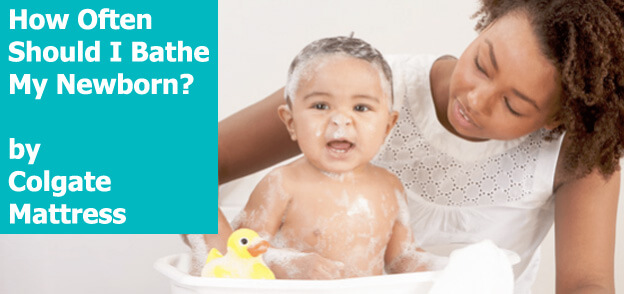After Birth
The first days after birth is a unique time in your baby’s life. They are adjusting to life outside the womb, learning how to breastfeed and more. To make this transition smoother, most experts recommend delaying baby’s first bath.
The Academy Of American Pediatrics (AAP) recommends that the first bath be delayed for the following reasons:
- Body temperature: Babies who aren’t bathed right away may be better able to regulate their body temperatures.
- Blood sugar: Delaying the first bath can reduce hypoglycemia (drops in blood sugar).
- Bonding: Skin-to-skin time and bonding are more likely to happen if babies are kept with their parents and have their first baths delayed.
- Breastfeeding: Studies have shown that delaying the first bath increases the rate at which babies initiate breastfeeding after birth, and increases their chances of continued breastfeeding success.
- Dry skin: Your baby is born with a waxy coating called vernix, which is a natural moisturizer and also has antibacterial qualities. Delaying the first bath allows your baby’s skin to stay soft, healthy, and prevents it from drying out.
The World Health Organization (WHO) recommends you delay your baby’s first bath for 24 hours, if possible. If 24 hours is not possible, WHO recommends you delay it by six hours.
Before the Umbilical Cord Falls Off
For the first few weeks of baby’s life, before their umbilical cord stump falls off, you should not fully immerse your baby in water. Instead, it’s recommended that you give baby a sponge bath or bathe baby with a washcloth.
Your baby’s umbilical cord stump should fall off within the first one to two weeks of life, at which point you can immerse your baby in water.
Best Water Temperature
In general, lukewarm temperatures are ideal. The AAP recommends that your baby’s bath be no more than 120 degrees Fahrenheit. Test the water first to see if it is an appropriate temperature for your baby.
How Often Should A Newborn Be Bathed?
You don’t need to give your newborn a bath every day. Three times a week might be enough until your baby becomes more mobile. Again, too many baths can dry out his or her skin and create irritation.
Most newborns do not get very dirty, so you can spot-clean areas of concern in-between baths — such as the face, neck and diaper area. As babies get older they are going to get dirtier because they will be exploring and playing outside. Your bathing frequency will naturally increase over time.

